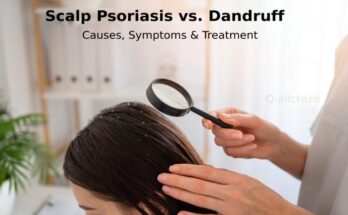If you’ve ever wondered how to naturally boost your hair growth, mixing essential oils may be your answer. Essential oils have been used for centuries to promote scalp health, strengthen hair follicles, and encourage growth. In this article, we’ll explore how you can effectively mix essential oils to promote hair growth, while also covering best practices for safety and results. This is an informational guide designed to give you an in-depth understanding of the best essential oils for hair growth and how to combine them properly.
Why Use Essential Oils for Hair Growth?
Essential oils like rosemary, lavender, and peppermint have active compounds that can stimulate your scalp, improve circulation, and strengthen hair follicles. These oils also balance scalp oil production and provide antimicrobial properties that can clear away dead skin cells, paving the way for healthier hair.
Key Benefits:
- Stimulate hair follicles for faster growth
- Improve scalp health by reducing inflammation and dandruff
- Strengthen hair and reduce hair loss
How Essential Oils Promote Hair Growth
Essential oils contain potent plant extracts with properties that help boost hair health. Oils like rosemary and peppermint have been shown to stimulate circulation in the scalp, which nourishes hair follicles. Others, like tea tree oil, fight dandruff and maintain a clean, healthy scalp environment—key factors for hair growth.
Top Essential Oils for Hair Growth
Not all essential oils are created equal when it comes to hair growth. Here are some of the top options:
1. Rosemary
Rosemary oil is one of the most well-known oils for hair growth. It helps improve circulation, delivering oxygen and nutrients directly to your hair follicles. Studies have shown that rosemary oil is as effective as minoxidil, a common hair growth treatment.
2. Peppermint
Peppermint oil creates a tingling sensation that indicates increased blood flow to the scalp, helping to invigorate hair follicles. Its cooling properties also soothe irritation.
3. Lavender
Lavender oil is popular for its calming scent, but it also has antimicrobial properties that help soothe scalp irritation and dandruff, creating a healthy environment for hair growth.
4. Tea Tree
Tea tree oil is effective at removing dead skin cells, unclogging hair follicles, and fighting scalp conditions like dandruff. A clean, balanced scalp is key for hair growth.
5. Cedarwood
Cedarwood oil is known to balance oil production in the scalp. It has antifungal and antibacterial properties, which make it great for reducing dandruff and scalp conditions that may hinder hair growth.
Step-by-Step Guide: How to Mix Essential Oils for Hair Growth
1. Choose a Carrier Oil
Before mixing essential oils, you’ll need a carrier oil to dilute them. The most popular carrier oils for hair growth are:
- Coconut Oil: Strengthens and nourishes hair strands.
- Jojoba Oil: Mimics natural scalp oils and is ideal for all hair types.
- Argan Oil: Rich in antioxidants and vitamin E, perfect for moisturizing the scalp.
- Sweet Almond Oil: A lightweight option, perfect for those with fine hair that tends to get weighed down.
2. Dilution Ratio
It’s important to dilute essential oils before applying them to your scalp to avoid irritation. The general rule is a 2% dilution:
- 12 drops of essential oil for every 1 ounce of carrier oil.
3. Mixing Process
- Start with 1-2 tablespoons of your chosen carrier oil.
- Add 6-12 drops of your chosen essential oil (or a combination of oils).
- Stir well and transfer the mix into a clean, dark glass bottle for storage.
- Label the bottle with the date and ingredients for future use.
DIY Essential Oil Recipes for Hair Growth
Here are some easy DIY essential oil blends you can try at home:
Recipe 1: Rosemary & Peppermint Hair Growth Serum
- 1 tablespoon of coconut oil
- 6 drops of rosemary essential oil
- 6 drops of peppermint essential oil
How to use: Massage into your scalp and leave it for at least 30 minutes before washing off.
Recipe 2: Lavender & Tea Tree Dandruff Remedy
- 1 tablespoon of jojoba oil
- 5 drops of lavender essential oil
- 5 drops of tea tree oil
How to use: Apply to damp scalp, leave for 20 minutes, and rinse out.
Recipe 3: Cedarwood Strengthening Blend
- 1 tablespoon of argan oil
- 4 drops of cedarwood oil
- 4 drops of rosemary oil
How to use: Massage into the scalp, leave overnight, and wash out the next morning.
How to Apply Essential Oils for Best Results
1. Section Your Hair
Part your hair into sections to ensure even application to your scalp.
2. Massage the Scalp
Use your fingertips to massage the oil mixture into your scalp in circular motions for 5-10 minutes. This boosts blood circulation and enhances absorption.
3. Leave It On
For maximum benefit, leave the oil on for at least 30 minutes. You can also leave it overnight for a deeper treatment.
4. Wash and Rinse
Use a mild shampoo to thoroughly wash out the oils. Make sure not to use harsh shampoos, as they can strip away the natural oils from your scalp.
Pro Tip: Use these treatments 2-3 times a week for best results.
Common Mistakes to Avoid
- Using Undiluted Essential Oils: Always dilute essential oils with a carrier oil before applying to the scalp.
- Skipping the Patch Test: Test a small area of your skin before full application to ensure you don’t have an allergic reaction.
- Overusing Essential Oils: More is not better! Stick to the recommended amounts to avoid scalp irritation.
- Applying Oils to Dirty Hair: Always apply oils to a clean scalp for better absorption.
Conclusion
Essential oils are a natural, effective way to promote hair growth when used correctly. By choosing the right oils, following dilution guidelines, and applying the mixture consistently, you can encourage healthy hair growth and improve scalp health. Stick to a routine, and in a few months, you’ll likely see noticeable changes in your hair.
Remember: Always perform a patch test and consult a healthcare professional if you have underlying scalp conditions.
Frequently Asked Questions (FAQ)
Q1: Can essential oils cause hair loss?
A: When used correctly and in proper dilution, essential oils do not cause hair loss. However, undiluted oils or overuse can lead to irritation and scalp problems.
Q2: How long does it take to see results from essential oils?
A: Results vary from person to person. Most people start seeing noticeable changes after 3-6 months of regular use.
Q3: Can I mix different essential oils?
A: Yes, combining different oils like rosemary and peppermint can provide added benefits. Just ensure the total number of drops doesn’t exceed the recommended dilution.
Q4: Can essential oils help with severe hair loss?
A: Essential oils can promote hair growth, but they won’t cure genetic or medical conditions that cause severe hair loss. Consult a dermatologist if you’re experiencing significant hair loss.
Q5: Are essential oils safe for all hair types?
A: Yes, essential oils are safe for all hair types, but it’s important to select oils that suit your hair and scalp type. For example, those with oily scalps may benefit more from oils like tea tree or cedarwood.
Q6: Can I use essential oils every day?
A: It’s best to use essential oils 2-3 times per week. Daily use could potentially irritate your scalp, depending on the oil.
Q7: Can essential oils cure hair loss?
A: While essential oils can promote hair growth and scalp health, they cannot cure underlying conditions like genetic hair loss (androgenetic alopecia). It’s best to consult a dermatologist for severe hair loss concerns.




